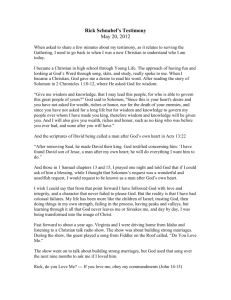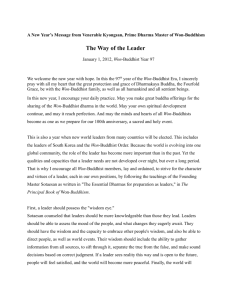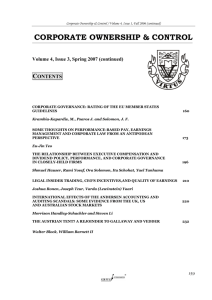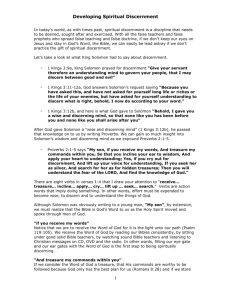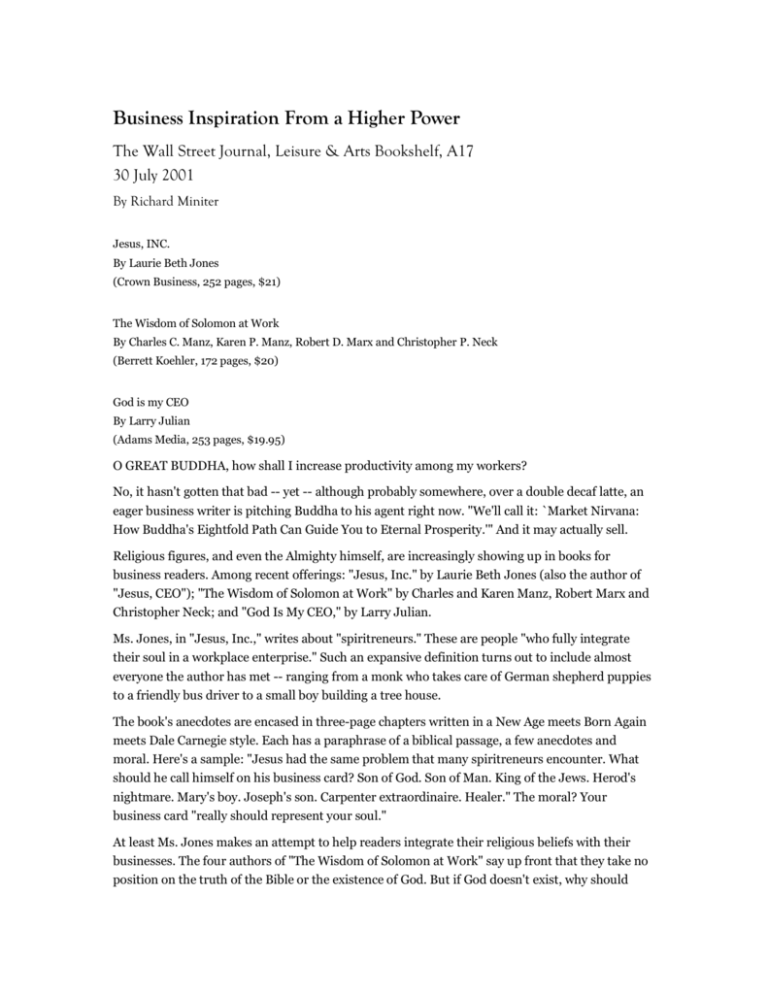
Business Inspiration From a Higher Power The Wall Street Journal, Leisure & Arts Bookshelf, A17 30 July 2001 By Richard Miniter Jesus, INC. By Laurie Beth Jones (Crown Business, 252 pages, $21) The Wisdom of Solomon at Work By Charles C. Manz, Karen P. Manz, Robert D. Marx and Christopher P. Neck (Berrett Koehler, 172 pages, $20) God is my CEO By Larry Julian (Adams Media, 253 pages, $19.95) O GREAT BUDDHA, how shall I increase productivity among my workers? No, it hasn't gotten that bad ­­ yet ­­ although probably somewhere, over a double decaf latte, an eager business writer is pitching Buddha to his agent right now. "We'll call it: `Market Nirvana: How Buddha's Eightfold Path Can Guide You to Eternal Prosperity.'" And it may actually sell. Religious figures, and even the Almighty himself, are increasingly showing up in books for business readers. Among recent offerings: "Jesus, Inc." by Laurie Beth Jones (also the author of "Jesus, CEO"); "The Wisdom of Solomon at Work" by Charles and Karen Manz, Robert Marx and Christopher Neck; and "God Is My CEO," by Larry Julian. Ms. Jones, in "Jesus, Inc.," writes about "spiritreneurs." These are people "who fully integrate their soul in a workplace enterprise." Such an expansive definition turns out to include almost everyone the author has met ­­ ranging from a monk who takes care of German shepherd puppies to a friendly bus driver to a small boy building a tree house. The book's anecdotes are encased in three­page chapters written in a New Age meets Born Again meets Dale Carnegie style. Each has a paraphrase of a biblical passage, a few anecdotes and moral. Here's a sample: "Jesus had the same problem that many spiritreneurs encounter. What should he call himself on his business card? Son of God. Son of Man. King of the Jews. Herod's nightmare. Mary's boy. Joseph's son. Carpenter extraordinaire. Healer." The moral? Your business card "really should represent your soul." At least Ms. Jones makes an attempt to help readers integrate their religious beliefs with their businesses. The four authors of "The Wisdom of Solomon at Work" say up front that they take no position on the truth of the Bible or the existence of God. But if God doesn't exist, why should
anyone pay attention to Solomon's wisdom or the wisdom of the other Old Testament figures who are occasionally cited? Mostly "The Wisdom of Solomon at Work" is a collection of personal stories, some of them loosely connected to biblical passages, many not. The best concerns Aaron Feuerstein's effort to rebuild Malden Mills after a devastating fire. The fabric maker lost his factory and vowed to keep paying his 3,000 employees, even the 1,000 or so who couldn't work because their workplace was burned up. When the plant was rebuilt, loyal workers increased productivity and the business boomed. This isn't a new story, and the authors never connect the mill owner's decision to the Bible. Solomon goes unmentioned. Maybe he is lucky. Elsewhere, in a passage subtitled "Facing Yourself Squarely," we read this mellifluous paraphrase: "The story of David and Bathsheba illustrates that we can become a prisoner of our own cultural context without realizing that the decisions being made may have significant moral costs." Well, that is one way of putting it! In a kind of manifesto statement about their "wisdom framework," the authors note that, for all of us, "our greater exposure to the bountiful ideas of an increasingly multiethnic, multicultural society reveals perspectives that we would have missed out on a generation ago." But are such "perspectives" valuable? Not on the evidence of this book. Larry Julian's "God Is My CEO" is a more serious work, capturing some of the difficulty of combining Christianity and capitalism. Mr. Julian ­­ who describes himself as a Jew with a "special relationship with Jesus Christ" ­­ doesn't duck the hard questions or employ airy platitudes. Instead he introduces the reader to a series of real business leaders whom he has actually interviewed ­­ a distinction in this genre. In one chapter, he tells us about Linda Rios Brook, president of KLGT­TV in Minneapolis, and her dilemma. "The Jerry Springer Show" was, by far, the station's most profitable program. But Ms. Brook found its content deeply offensive. Dropping the show would cost the station a fortune, and a meeting with Mr. Springer yields only a self­righteous speech from him ­­ "I will stand before God and be able to defend what I have done!" So Ms. Brook prayed, and inspiration came. She decided to run the show with a "crawl" ­­ a text message running across the bottom of the screen. Instead of warning about hurricanes, it asked "NEED A FRIEND?" followed by an 800 number that rings at a local Christian counseling center. Hundreds have been talked out of suicide, counseled against drugs or helped out of an abusive relationship, according to the book. That sounds closer to wisdom. The entire genre of religious guidance for business may have one incidental benefit, whatever the merits of individual books. Kenneth Adelman, the author of "Shakespeare In Charge," about the Bard and business, says that his book­based presentations often get business executives to thinking about Shakespeare. A few days after he spoke to some lawyers in Baltimore, one of the participants told him that there was a three­week wait at a local Blockbuster for "Henry V." "I hear that every time," says Mr. Adelman. Who knows? Maybe these books will cause a brief run on the Bible. Or at least on "The Ten Commandments" at the video store.
­­­ Mr. Miniter is a Wall Street Journal Europe editorial­page writer. His book "The Myth of Market Share" will be published by Random House's Crown Business early next year. Copyright (c) 2001, Dow Jones & Company, Inc.) (c) 2005 Dow Jones Reuters Business Interactive, LLC (trading as Factiva). All Rights Reserved.

